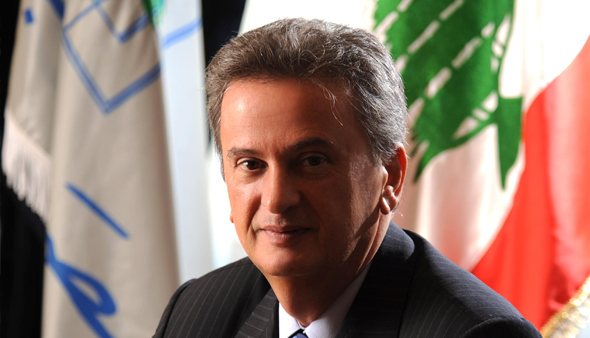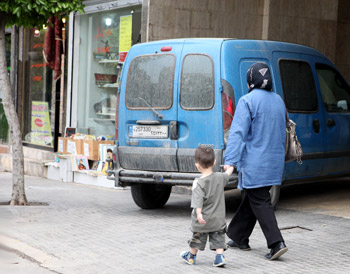Lebanon’s Central Bank forecast steady GDP growth amid continue Syrian strife and foundering local tourism sector
The Banque du Liban has projected real GDP growth in Lebanon at between 2 percent and 4 percent in 2013 amid an economy stalled by the continuing strife in neighboring Syria and the depressed tourism sector caused by the resulting security worries.

Lebanon’s Central Bank forecast steady GDP growth amid continue Syrian strife and foundering local tourism sector
By T.K. Maloy
BEIRUT — The Banque du Liban has projected real GDP growth in Lebanon at between 2 percent and 4 percent in 2013 amid an economy stalled by the continuing strife in neighboring Syria and the depressed tourism sector caused by the resulting security worries.
The
Banque du Liban
has projected real GDP growth in Lebanon at between 2 percent and 4 percent in 2013 amid an economy stalled by the continuing strife in neighboring Syria and the depressed tourism sector caused by the resulting security worries.
Recent International Monetary Fund projection reach no higher that 2 percent. Byblos Bank’s “Lebanon this Week” economic publication said that The Central Bank’s estimate compares to average growth rates of 2 percent between 2011 and 2012 and 8 percent during the 2008-10 period. The bank noted that that the ongoing conflict in Syria continues to disrupt trade routes and negatively affect the tourism sector.
BDL also noted that negative spillovers from the slowdown in tourism activity on other economic sectors have weighed on the country’s overall economic performance. In meetings this week, the Gulf Cooperation Council opted to advise their citizens not travel to Lebanon for this summer’s travel season based on security fears for the safety of Gulf Arab travelers.
“Most GCC states have urged their nationals to avoid traveling to Lebanon due to the instability of the security situation there,” Gulf Cooperation Council chief Abdullatif al-Zayani said Wednesday.
His comments came amid growing fighting in Tripoli between anti-and –pro-Assad factions; two rockets strikes in the south Beirut section where the Hezbollah movement is most heavily concentrated; a rocket attack on the Bekaa Valley-city of Balbeck, also a major Hezbollah enclave.
Member countries of the GCC, which include Bahrain, Kuwait, Oman, Qatar, Saudi Arabia and the United Arab Emirates, warned that Lebanon was “unsafe” for the 2013 tourist season. Similar warnings were issued last year, based on the same security worries.
Nassib Ghobril, Byblos Bank’s chief economist, questioned the Central Bank projections, observing, “Economic activity in Lebanon is largely based on confidence. But consumer confidence and investor sentiment have been, and continue to be, severely affected by political uncertainties, security breaches, and the growing impact of the Syrian conflict.”
He added, “Therefore, economic activity will remain stagnant until a major positive political shock restores consumer confidence to the levels of 2009 and 2010. So it is hard to see how real GDP can reach the IMF’s forecast of 2 percent for this year, let alone achieve higher projections.”
Official statistics report that tourism to Lebanon dropped by 23.7 percent in 2011; and 17.5 percent in 2012, and have dropped a further 12.5 percent in the first quarter of this year.
According to the BDL, because of the ongoing gridlocked domestic political climate there have been no major fiscal initiatives. In lieu of any other initiatives, the, ”key fiscal priority for the government remains the reduction of the deficit to international norms and to simultaneously maintain macroeconomic stability and lay the foundation for a more dynamic economy.” Byblos Bank’s “Lebanon This Week,” reported.
Nevertheless, the Banque du Liban statement said the Lebanese economy remains resilient as a result of the bank’s policy of monetary stability, a solid banking sector, loyal investors and sustained remittance inflows from the Lebanese Diaspora.
The Central Bank’s strategy of maintaining a large stock of assets in foreign currency as a precautionary measure allows Lebanon to deal with any crisis that would face its economy. It added that its assets in foreign currency currently exceed $36bn, making it the second largest holder of such assets among economies in the Middle East and North Africa.
Also, the bank said that the stimulus package that it launched earlier this year aims to spark economic growth by supporting domestic demand, in order offset the marked decline in regional demand. It noted that the package will not lead to inflationary pressure. It added that it is targeting an inflation level of 4 percent this year even if the government implements an expected 2 percent increase in wages for public-sector employees.
According to the Central Bank, the Lebanese banking sector is still reporting a healthy performance despite the challenging operating environment and the slight decrease in the sector’s profits. Lebanon’s financial sector is not likely to face negative shocks this year despite the domestic economic slowdown and regional instability, the bank noted.
The BDL said that Lebanese banks have been able to weather various ongoing internal and external crises during the last several years, and have successfully absorbed the negative repercussions of regional unrest. Also, Lavantine banks high liquidity ratios have allowed them to continue to provide credit to the Lebanese market.
According to the Central Bank, the Lebanese banking system’s Basel III Capital Adequacy Ratio exceeds 10 percent and the sector sufficiently increased provisions to cover potential losses from foreign operations. Under strict regulation of the BDL, the banking sector has adhered to Basel III liquidity requirements, whereas the United States and the European Union have been unable to meet these same requirements.
The recent precipitous collapse of the Cypriot banking sector is a worst case scenario of the domino effect of low liquidity.
Lebanon’s Association of Banks head, Joseph Torbey, said in mid-May during a banking conference, “The managers of Lebanese banks have maintained high liquidity, especially in foreign currencies 30 percent of deposits are in foreign currency to protect the sector from any crisis.”